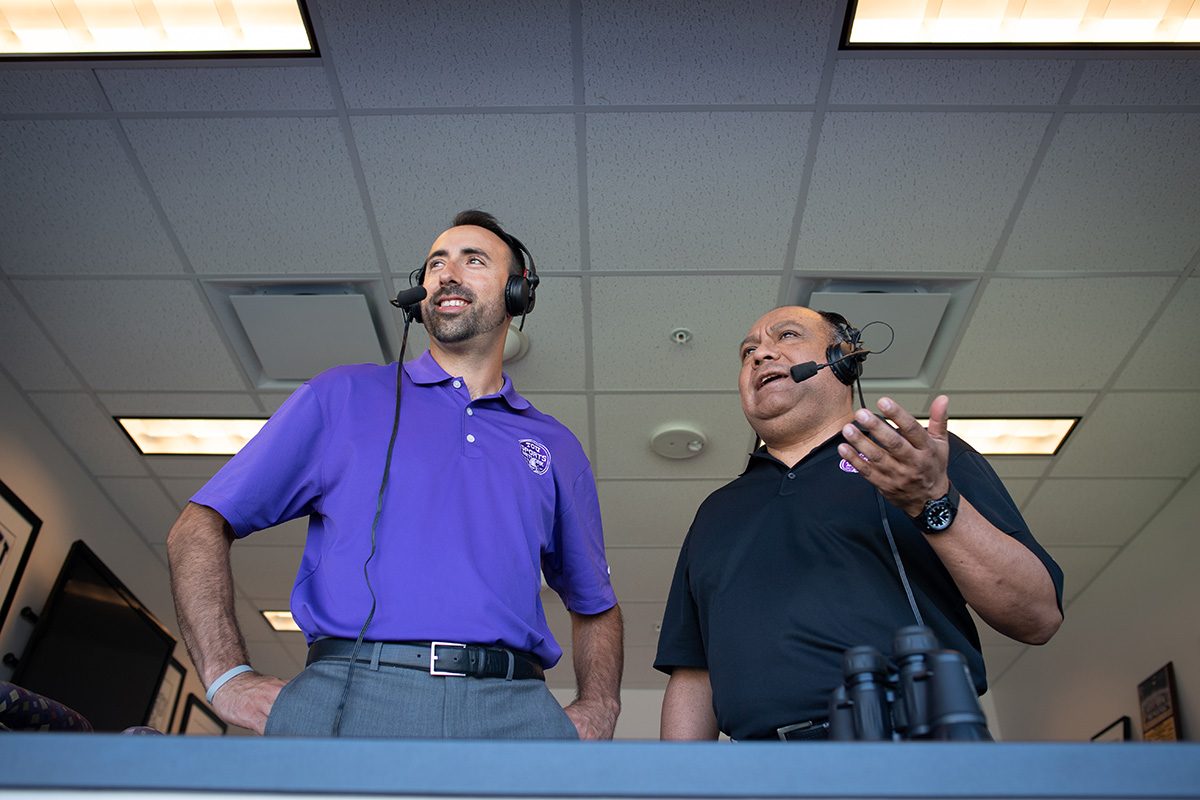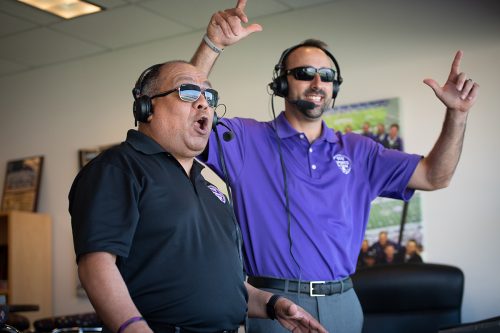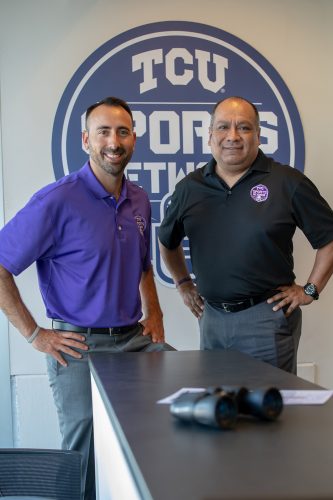
Miguel Cruz, Elvis Gallegos Bring TCU Football to Spanish Speakers
Broadcasters bring information, excitement and Latin spice to the airwaves on game day.
Miguel Cruz was among the thousands of people sitting in the Rose Bowl, stunned by TCU’s 2011 triumph over Wisconsin. But he and Elvis Gallegos ’07 had extra reason to underline that New Year’s Day in the history books. The game concluded their first season broadcasting Horned Frog football games in Spanish.
Before 2010, college sports programs in North Texas did not offer games in Spanish. That meant the 1,324,152 hispanohablantes living in the region in 2010, according to the U.S. census, had no way to share in the excitement in their primary language. They represented a massive untapped market, said Brian Estridge, director of broadcasting for athletics.
Estridge hired Cruz, a veteran broadcaster who was doing a Spanish-language sports television show and radio reporting for local professional teams, to do play-by-play for TCU. Estridge tapped native Spanish speaker Gallegos, who played safety for Coach Gary Patterson’s teams in the mid-aughts, to provide insight as the color commentator.
Gallegos said he knew firsthand about the potential of appealing to Spanish-speaking audiences. His parents, born in Chihuahua, Mexico, taught him that most Latino families are sports-crazy. Many families like his, Gallegos said, were in the process of bridging languages, cultures and generations. Why not make TCU Football a nexus? “It was a no-brainer.”
Learning Experience
Before the 2010 season, Mexico-born Cruz used his media influence to inform Fort Worth-area Spanish speakers that they could finally get hip to college football, thanks to the radio program debuting on media giant Univision’s 1270 AM station.
He said audiences jumped aboard and soon started to refer to the Horned Frogs as “we” as they filled Twitter feeds with opinions about the college version of fútbol Americano.
The inaugural season taught Cruz and Gallegos to be adaptable. They called a September home game from the outdoor photo pit in triple-digit heat.
When ESPN’s College GameDay set up shop in Salt Lake City in November, a crowded press box forced the Spanish crew into the stands, where they broadcast the big win in the middle of a sea of dejected Utes fans.
It was also a learning experience in how to introduce college football to new audiences, who may not have known much about the controversial championship formula or the nuances of the amateur version of the sport.
Spanish-speaking football fans, Cruz said, are not interested in statistics but often want to soak up rule explanations. His presentation, as a result, is a careful balance of information, excitement and what Gallegos describes as Latin spice (food is a frequent topic of discussion).
Gallegos doles out insider analysis from his firsthand knowledge of Patterson’s trademark defenses. Cruz said his partner expanded football comprehension for him, too.
Their repartee became second nature in a hurry, said John Denton ’85, director of major gifts for the TCU Frog Club. He does color commentary for TCU’s English-language radio broadcasts. “It takes a little while to develop chemistry on air, and it hasn’t taken them very long.”

Miguel Cruz (left) and Elvis Gallegos bring TCU football to Spanish speakers. Photo by Leo Wesson
Estridge said the Houston Texans franchise was so impressed that they tried to poach Cruz and Gallegos to launch Spanish broadcasts. Both declined.
Expanding the Reach
In eight years, TCU’s Spanish audiences have ballooned. Before the 2018 season, Univision moved the game calls to KFZO-FM 99.1, one of Nielsen’s top-rated Spanish-language stations in the region.
The now-seasoned broadcasters have also settled into an enjoyable fall routine. After Gallegos fulfills his Thursday-night work duties as an athletic coordinator and football coach for a junior high school near Fort Worth, he joins the entire radio team — English, Spanish, statisticians and sound engineers. Together, they travel to road games, and football is the main topic of conversation. The banter, Cruz said, is “pretty much like we’re rehearsing our broadcast.”
When game day arrives, the information needs be on autopilot because the pace of the game and emotion of packed stadiums take over. The latter is “something you don’t need to describe because people are feeling it through the airwaves,” Gallegos said.
Football fever is growing south of the border as well. ESPN’s Monday Night Football television broadcasts now often include Spanish versions on main channels, which are accessible in Mexico. Cruz said his native country halts soccer tournaments on Super Bowl weekend because almost everyone is tuned in to American fútbol.
Mexico will host NFL games through at least 2021, and Cruz and Gallegos said they would love TCU to schedule a contest. The million-plus Spanish speakers in Dallas-Fort Worth are the tip of the iceberg in terms of potential audiences, Cruz said. And the Frogs wouldn’t be a hard sell.
“Everybody loves a winner.”
La Docena
by Caroline Collier
Miguel Cruz and Elvis Gallegos’ 12 most memorable experiences while broadcasting TCU Football games.
Sept. 4, 2010 | Arlington, Texas
The game, at the massive AT&T Stadium, was Gallegos’ first as a broadcaster: “I was so nervous but so excited at the same time.”
#2: TCU 47, Utah 7
Nov. 26, 2010 | Salt Lake City, Utah
National media congregated in the press box, forcing TCU’s Spanish broadcast crew to call the game from the middle of the stands. “We had a little table, set our stuff up, and [Utah fans] were all around us — right there,” Gallegos said. “You gotta be careful about getting too excited.”
Jan. 1, 2011 | Pasadena, California
TCU’s Rose Bowl win, capping an undefeated season, “was magical,” Cruz said.
Nov. 5, 2011 | Laramie, Wyoming
The game ended shortly before a massive winter storm pelted the Rocky Mountains. The radio crew unplugged wires and packed headphones in a hurry, Cruz said. “We were just trying to get away as fast as we could to drive from Laramie to Denver.”
Nov. 12, 2011 | Boise, Idaho

Elvis Gallegos and Miguel Cruz said they learned to be adaptable during their inaugural season. Photo by Leo Wesson
The victory, which the crew called from a rooftop overlooking the stadium, held special significance for Gallegos, who was part of the 2003 TCU team that lost to the Broncos in the first Fort Worth Bowl. For the next decade, he said, “there were talks about which program is better, which coach is better.”
#6: TCU 39, West Virginia 38 (2OT)
Nov. 3, 2012 | Morgantown, West Virginia
“Growing up, I didn’t get out much, didn’t see many places,” Gallegos said. “The small towns or college towns, those are really neat.”
#7: TCU 20, Texas 13
Nov. 22, 2012 | Austin, Texas
In a Thanksgiving night contest against longtime nemesis Texas, TCU showed that the state’s football hierarchy had been reorganized. “Everybody was saying, ‘What is this tiny TCU team doing here?’ ” Cruz said. “And we won the game in a very convincing fashion.”
Dec. 31, 2014 | Atlanta, Georgia
TCU, left out of the inaugural College Football Playoff, took out its frustrations on Ole Miss. “There was so much to say: the way the system was at the time, TCU being left out, SEC versus Big 12, TCU and its dominance,” Gallegos said. “It made for a really good flow, a good broadcast.”
Sept. 28, 2015 | Lubbock, Texas
Horned Frog Nation went wild after the last-minute win. The radio crew did, too, Gallegos said. “You’re hugging and hitting each other, but at the same time you’re still trying to finish your job and continue the call.”
Jan. 2, 2016 | San Antonio, Texas
In an Alamo Bowl thriller, the Frogs never lost confidence in themselves, Cruz said. “That was a huge lesson to everybody.”
#11: Iowa State 14, TCU 7
Oct. 8, 2017 | Ames, Iowa
Once again, Cruz and Gallegos called the game from the stands. “That place was packed,” Gallegos said. “It meant so much to that program. … I love that they care so much.”
#12: TCU 39, Stanford 37
Dec. 28, 2017 | San Antonio, Texas
The Alamo Bowl “was probably the best game of the college season,” Cruz said.

Your comments are welcome
Comments
Related reading:
Features
Dan Jenkins Is a TCU Treasure
The award-winning sports writer made his name writing for Sports Illustrated and Golf Digest, and his books include Semi-Tough, which became a movie.
Features
KTCU Celebrates 70 Years
The campus radio station offers students a chance for real-world experience.
Campus News: Alma Matters
Class explores booming Spanish-language media
Since 1980, the U.S. Hispanic population has grown from 14.6 million people to nearly 52 million, and TV ratings and circulation figures are showing the impact.